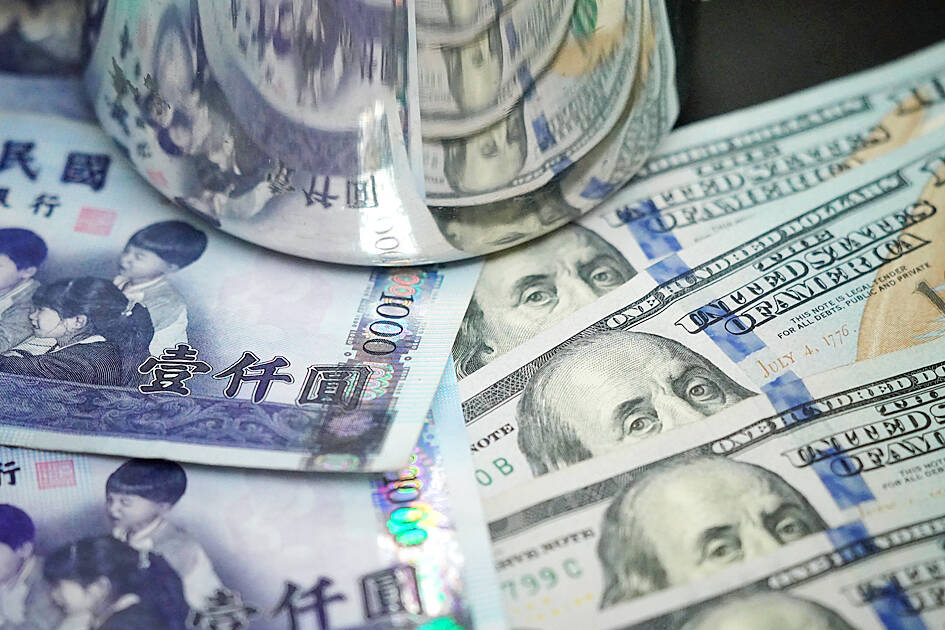Taiwan’s foreign exchange reserves totaled US$577.58 billion late last month, up US$9.06 billion from the previous month on the back of investment returns and favorable currency movements, the central bank said yesterday.
The balance meant Taiwan remained the fourth-largest holder of foreign-exchange reserves, trailing only China, Japan and Switzerland.
“The foreign exchange market was relatively quiet in January, compared with this month, when US President Donald Trump’s tariff policy with Canada, Mexico and China unnerved investors,” Department of Foreign Exchange Director-General Eugene Tsai (蔡炯民) told a news conference in Taipei.

Photo: CNA
The New Taiwan dollar on Monday touched NT$33 against the greenback amid panic selling of local shares as investors sought a safe haven in the US dollar before Washington’s tariffs on Canada, Mexico and China took effect.
Trump later announced a 30-day delay after Mexico and Canada agreed to step up border controls to curb illegal immigrants.
The central bank is confident it can maintain order and stability in the local currency market, helped by its plentiful foreign-exchange reserves and demand for the NT dollar by exporters, Tsai said.
Many exporters joined the market on Monday to sell the US dollars they had accumulated from trade, he said, adding that the central bank also intervened to slow volatility.
US tariffs might not necessarily weigh on the local currency, although Trump’s evasive trade stance is adding difficulty to the central bank’s formation of world views, Tsai said.
The emergence of DeepSeek, a relatively low-cost, but efficient Chinese artificial intelligence model, also created a big splash across global financial markets, as it sparked concern that orders at Nvidia Corp could slow, analysts said.
Dozens of Taiwanese firms collaborate with Nvidia.
As of the end of last month, foreign investors held US$864.8 billion of local stocks and debt, equivalent to 150 percent of Taiwan’s foreign-exchange reserves, Tsai said, adding that both figures represent historic highs.
Foreign capital might flee Taiwan if Trump makes good on his pledge to impose tariffs on semiconductors, limiting profit for local suppliers, analysts have said.

SEEKING CLARITY: Washington should not adopt measures that create uncertainties for ‘existing semiconductor investments,’ TSMC said referring to its US$165 billion in the US Taiwan Semiconductor Manufacturing Co (TSMC, 台積電) told the US that any future tariffs on Taiwanese semiconductors could reduce demand for chips and derail its pledge to increase its investment in Arizona. “New import restrictions could jeopardize current US leadership in the competitive technology industry and create uncertainties for many committed semiconductor capital projects in the US, including TSMC Arizona’s significant investment plan in Phoenix,” the chipmaker wrote in a letter to the US Department of Commerce. TSMC issued the warning in response to a solicitation for comments by the department on a possible tariff on semiconductor imports by US President Donald Trump’s

The government has launched a three-pronged strategy to attract local and international talent, aiming to position Taiwan as a new global hub following Nvidia Corp’s announcement that it has chosen Taipei as the site of its Taiwan headquarters. Nvidia cofounder and CEO Jensen Huang (黃仁勳) on Monday last week announced during his keynote speech at the Computex trade show in Taipei that the Nvidia Constellation, the company’s planned Taiwan headquarters, would be located in the Beitou-Shilin Technology Park (北投士林科技園區) in Taipei. Huang’s decision to establish a base in Taiwan is “primarily due to Taiwan’s talent pool and its strength in the semiconductor

An earnings report from semiconductor giant and artificial intelligence (AI) bellwether Nvidia Corp takes center stage for Wall Street this week, as stocks hit a speed bump of worries over US federal deficits driving up Treasury yields. US equities pulled back last week after a torrid rally, as investors turned their attention to tax and spending legislation poised to swell the US government’s US$36 trillion in debt. Long-dated US Treasury yields rose amid the fiscal worries, with the 30-year yield topping 5 percent and hitting its highest level since late 2023. Stocks were dealt another blow on Friday when US President Donald

UNCERTAINTY: Investors remain worried that trade negotiations with Washington could go poorly, given Trump’s inconsistency on tariffs in his second term, experts said The consumer confidence index this month fell for a ninth consecutive month to its lowest level in 13 months, as global trade uncertainties and tariff risks cloud Taiwan’s economic outlook, a survey released yesterday by National Central University found. The biggest decline came from the timing for stock investments, which plunged 11.82 points to 26.82, underscoring bleak investor confidence, it said. “Although the TAIEX reclaimed the 21,000-point mark after the US and China agreed to bury the hatchet for 90 days, investors remain worried that the situation would turn sour later,” said Dachrahn Wu (吳大任), director of the university’s Research Center for